
In less than 25 years, Guzman y Gomez has become a major player in Australia’s fast food sector, rapidly expanding to more than 200 stores from its first outlet at Sydney’s Newtown in 2006.
At its IPO last year, where the quick service restaurant (QSR) chain was valued at $2.2 billion, GYG launched plans to take that total to an eye-watering 1000 stores during the next 20 years.
Its target portfolio would rival the presence of long-term industry players such as McDonald’s, which opened its first store in Australia in 1971.
But to grow from its current 211 Australian stores, as at the end of 2024 third quarter, will take a measured approach says GYG chief development officer George Mandilis, who joined the company in 2020 from the ASX-listed Wesfarmers.
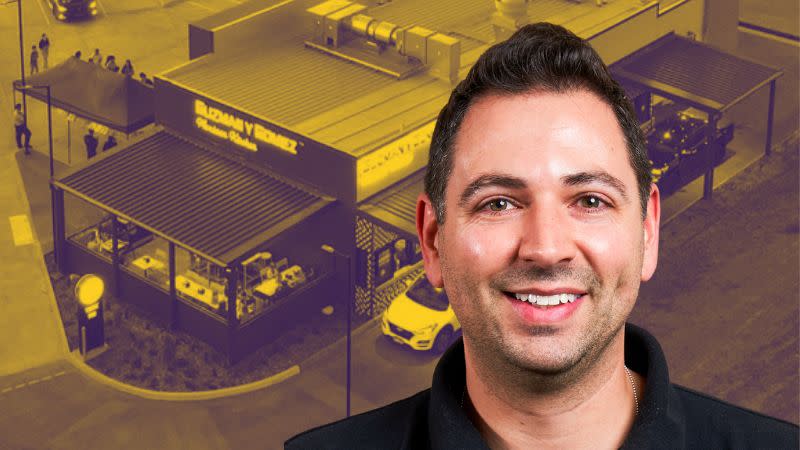
“We’re going to get to 1000 stores, and we’re going to do it in a methodical way that grows the market sustainably,” Mandilis says.
And GYG’s approach to real estate has changed considerably in its relatively short time in the game.
GYG has consciously turned away from the shopping centre food court, Mandilis says.
“We have to pick real estate that matches our menu,” he says.
“You don’t really see us opening stores in food courts anymore, because we are no longer just a lunch-trading business. We need to cater our real estate so that customers can access it at any time they want.”
The drive-thru model now makes up 85 per cent of the GYG portfolio, he says, and much of the rest are strip sites.
“Both of those types of real estate allow us to capture all customers at any time we want,” Mandilis says.
The aim of the game is to always obtain AAA locations, Mandilis says.
“We want all lanes of traffic to be able to turn in and access that site easily and make that customer journey really easy from the moment they see that beautiful, 12m digital pylon,” Mandilis says.
While much of its site sourcing is done in-house, GYG also works with companies such as Stockland, Dexus and HomeCo, and funds including Aware Super.
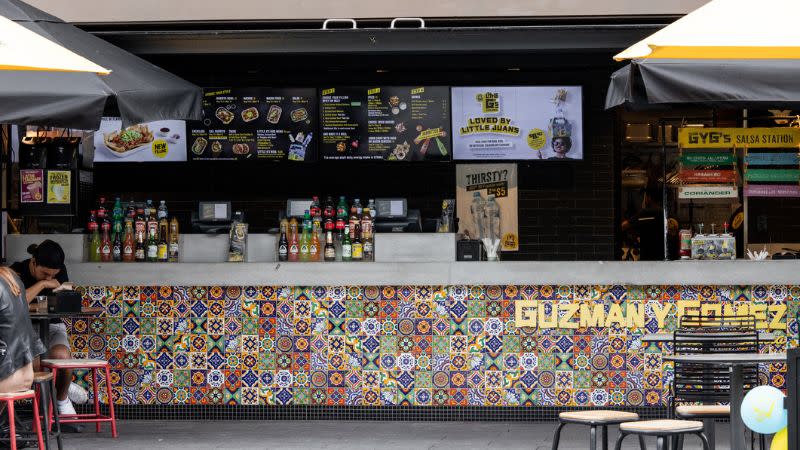
“But we’ve got mum-and-dad investors and single-holding strip-site operators who have had one shop for 20 years.
“Whoever’s holding the right real estate, we will transact with and we will transact in a way that makes it as easy as possible for them.”
GYG’s increasing brand recognition has aided site acquisition considerably.
“Five years ago, we worked very hard to tell people why they should pick GYG. Now quite often, developers call me first,” Mandilis says.
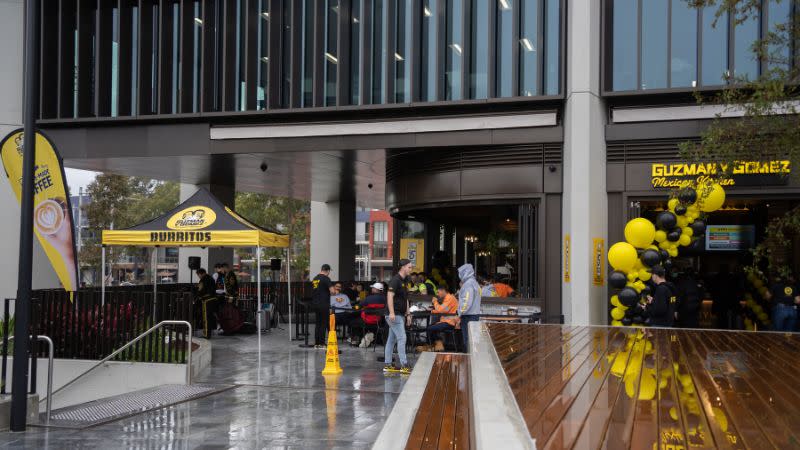
With tightly-held sites often in high demand, longer lease terms are preferred. While 10-year terms for strip sites and 15-years for drive-thrus are not unheard of, GYG typically aims for a minimum 20-year lease on drive-thru sites.
“And 50 years if we can get it. To put that in perspective, you can’t get a 20-year deal these days from a Woolworths or a Coles or a Kmart.
“So you talk about value and security from a real estate perspective, people love a GYG store because we offer great security.”
But this growth has also meant considering the challenges facing site owners and developers.
“Over the last few years, capital has been very expensive and land prices haven’t gone down, so of course there is an inherent upward movement on rents,” Mandilis says.
“A lot of developments don’t happen in markets like this because of the difficulty and the cost of entry, which goes back to why we spend so much time building a deep pipeline.”
This upward trend means that a 2000sq m to 3000sq m main road corner site in the Brisbane metro, for example, comes with a price tag of more than $4 million, he says.
“Then our landlord is probably going to spend the better part of $4 million building one of those sites.
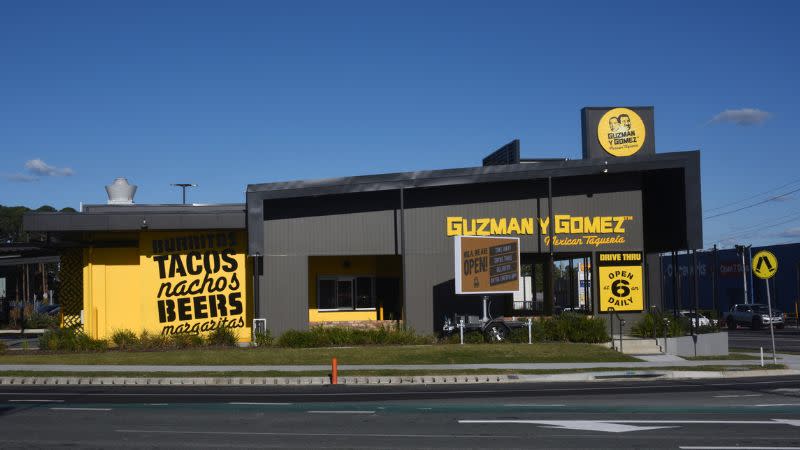
“So they’re in for $8 million—forget stamp duty, forget legal costs, forget holding costs.
“That’s $8 million, even if you wanted a minimum 5 per cent return on, there aren’t many retailers who are going to be happy to pay $400,000 a year.”
While GYG’s rent ceiling might be reasonably high, it still exists.
“[But] the benefit of GYG is, it’s not often we find ourselves in that situation.”
Developers in other sectors follow the real estate decisions of such players as GYG closely as a gauge of the potential for an area. But when is the right time to break into a new area?
“It’s something we debate all the time, how early is too early? How late is too late?”
Mandilis said partnering with EG Fuel to open a GYG in Oran Park in south-west Sydney had been a smart and successful move, thanks to the area’s future growth prospects as the opening of the Western Sydney Airport approaches.
But others have not quite reached their potential, such as GYG’s Westmead site across from the hospital and near the new light rail station.
“It’s a real up-and-coming area, but that one I probably opened a couple of years too early,” Mandilis says.
GYG benefits from an in-house tool that tracks population, traffic and existing site data to determine where it should go next and how well stores might perform.
But even the best-laid plans can go awry, thanks to post-Covid reality.
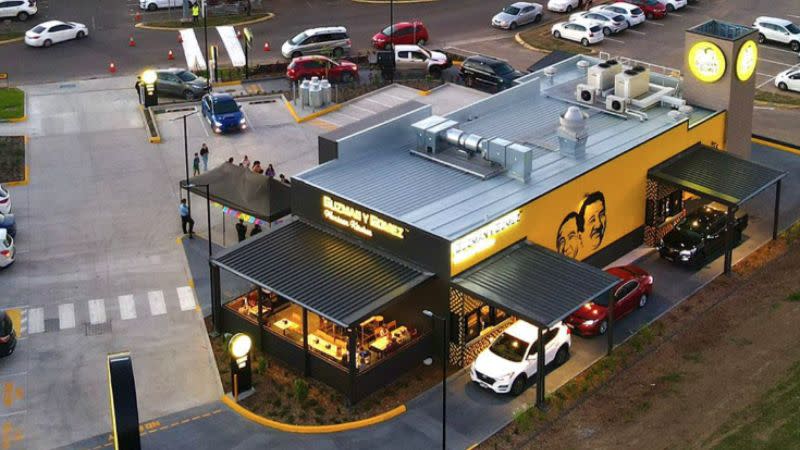
“We’ve learned a lot over the five years, whether it’s from the energy companies in WA not connecting electricity, which meant we had to use generators on a site for a year, and councils shutting down three days a week, so DAs, instead of taking six months, took 18 months.
“We were building a site and halfway through the construction company went under. And we learned that no other builder wants to pick up another builder’s site.
“We’ve been through all this crazy stuff. The important thing is we adjust our data and learn from it.”
As a result of construction troubles, GYG now has a handful of preferred builders in every state.
“We always do tenders to make sure it’s competitive and we’re not getting complacent, but nine times out of 10 the people who are trusted GYG builders will still be the cheapest, the most efficient and the quickest.
“The benefit of that is we have a deep understanding of their businesses, so we reduce a lot of those risks.”
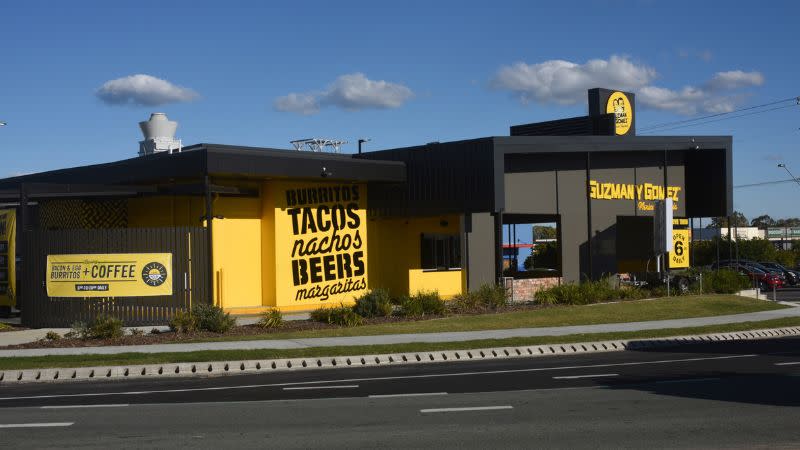
With a growing portfolio in Australia, six stores in Chicago and another US site to open this month, GYG is becoming a dab hand at real estate.
“We have high wages, a high cost of entry and very expensive real estate, so if you can get a sustainable operating model in Australia, you can grow sustainably elsewhere,” Mandilis says.
“The important thing for us is that whilst we think we do real estate well, we never have the mindset that we’re doing it the best we can.
“It’s always a growth mindset. Can we get better? What went wrong? How do we fix it?”




